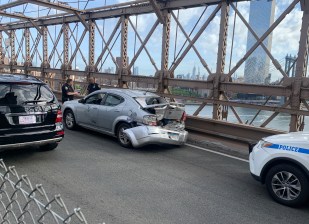NYPD’s New Transportation Chief Talks Vision Zero at Council Hearing

A marathon City Council hearing elicited some new details about Mayor Bill de Blasio’s Vision Zero agenda and brought out the raw emotion of New Yorkers mourning loved ones killed on city streets.
The top item on the agenda at the joint transportation and public safety committee hearing was police enforcement of traffic laws. Newly-minted NYPD Chief of Transportation Thomas Chan said the department would focus on speeding and failure to yield, as well as improper turns, disobeying signage, and using a handheld device while driving.

Chan trumpeted a recent increase in staffing at the Highway Division, soon increasing to 270 officers from the previous 170. But under questioning from Council Member Corey Johnson, Chan revealed some of the limitations of that unit. “They’re dedicated to patrol the highways: FDR Drive, Henry Hudson Parkway and roadways of that nature,” Chan said. “In terms of enforcement on the street, it’s going to be on the precinct level.”
With precinct-level attention traditionally focused on violent and property crime, many council members were skeptical that the department would devote sufficient resources to traffic safety. Chan said there are currently 56 speed guns distributed between 32 of the department’s 77 precincts, and the department has another 200 speed guns on order — most of them using laser technology, which is more effective on city streets than traditional radar. Additional officers at each precinct will receive the four-day training to operate speed guns, Chan said.
Council Member James Vacca said a reduction in manpower has made it more difficult for the department to do traffic enforcement. “Since 2001, the Highway Unit was cut by 50 percent,” he said. “Local precincts were also coping with a 7,000[-person] citywide reduction in manpower.”
For Vision Zero to be successful, Council Member Brad Lander said, it has to be about more than just providing additional manpower, which may or may not materialize. “This is a big change in NYPD culture and structure,” he said. “Recruits don’t sign up for the academy, in their minds, to write speeding tickets.”
“My goal is to change the mindset of the individual officers who are on daily patrol in the precincts. They are the ones who are going to make a difference on this,” Chan said. “I cannot rely on a speciality unit to do this to achieve this goal.”
At the press conference last week unveiling the city’s Vision Zero Action Plan, Police Commissioner Bill Bratton said the police, even with a renewed commitment to traffic enforcement, simply could not be everywhere they are needed to issue speeding and failure-to-yield tickets. Automated enforcement could fill the gap, but so far Albany legislation has restricted the city to 20 school zone speed cameras and 150 red-light cameras.
Transportation Commissioner Polly Trottenberg said Vision Zero — specifically, reducing the citywide speed limit and securing control over enforcement cameras — ranks high on the mayor’s Albany legislative agenda. “We aim to try and get some action this year,” she said, adding that she hopes her agency’s work over the next few months will build momentum for action from the state.

Trottenberg has set a goal of implementing street redesigns on 50 corridors, reducing speed limits on 25 arterial streets, adding 250 speed humps, and improving lighting at 1,000 intersections. To map out where these changes will be happening, the agency will be organizing traffic safety plans for each borough, and will soon outline a schedule of community meetings to hear concerns about traffic safety hotspots.
It’s not just DOT that will be gathering input: Manhattan Borough President Gale Brewer, testifying this morning, said community board managers in her borough have suggested 90 streets and intersections in need of attention.
“Never before have we seen such broad recognition that New York City faces an epidemic when it comes to traffic injuries and deaths,” transportation chair Ydanis Rodriguez said, adding that cooperation must extend across a wide range of communities and officials.
During his testimony, Taxi and Limousine Commission Chief Operating Officer Conan Freud said his agency is in many ways bound by rules outside of its control. Currently, the TLC can only suspend or revoke a hack license once there’s adjudication of a ticket. A bill from Council Member Helen Rosenthal would automatically suspend licenses for taxi drivers who kill.
The taxi driver who killed 9-year-old Cooper Stock on the Upper West Side, for instance, is still driving a cab. “He got away with a $300 summons. He killed a boy,” Rosenthal said, before asking what it would take to keep taxi drivers who kill off the streets until an investigation takes place.
“It’s a simple question. It’s a complicated answer,” Freud said. The TLC is currently reviewing Rosenthal’s legislation.
NYPD’s crash investigations didn’t get much attention during today’s hearing, but Amy Cohen, whose son Sammy was killed by a driver on Prospect Park West, told Streetsblog yesterday that NYPD said it would begin regularly releasing crash reports to families. Traditionally, it has been difficult for families to gain access to these records.
After city officials testified, family members of traffic violence victims told their stories. The emotion was palpable in the council chambers as mothers and fathers told of police coming to their doors with the news, their frustration at the lack of attention the cases were getting from the city, and the hope they felt with Vision Zero.
“I don’t want you to feel sorry for me,” said Lizi Rahman, whose son Asif was killed by a tractor-trailer truck driver on Queens Boulevard. “I want you to do something.”
